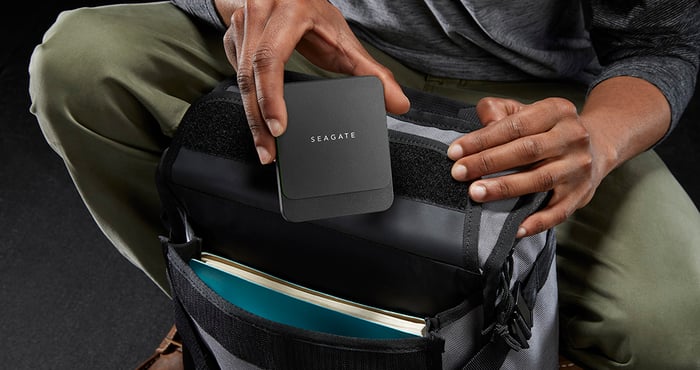In the rapidly evolving tech industry, stable dividends can sometimes be hard to come by. Consumer preferences can quickly shift, technological advances can disrupt incumbents, or companies may need to invest heavily to keep up with the competition. Still, there are plenty of candidates in tech that income investors should consider adding to their portfolios.
Let's take a look at three: Verizon Communications (NYSE:VZ), Seagate Technology (NASDAQ:STX), and Apple (NASDAQ:AAPL).

Image source: Verizon.
Verizon: A defensive dividend
As the largest wireless carrier in the U.S., Verizon offers a safe and stable dividend funded in part by nearly 95 million monthly cellphone bills. While Verizon isn't a growth stock (operating revenue grew just 0.8% last year), it steadily increases its dividend every year and produces strong free cash flow ($17.8 billion in 2019) to cover the payout. That's a testament to Verizon's scale: The wireless industry is notoriously capital intensive, yet Big Red is still able to invest heavily in 5G while having cash left over to pay investors.
Competition remains intense, particularly if T-Mobile and Sprint are able to close their proposed $26 billion merger, as the combined company would represent a stronger threat. But Verizon has been able to defend its No. 1 position -- the company just posted its highest fourth-quarter wireless additions in six years. Its total debt load is high at $111.5 billion, but Verizon plans to deleverage over time while remaining committed to its dividend.
In the event of an economic downturn, cellphone bills and other basic utilities remain a top priority in consumers' household budgets relative to discretionary items, reducing the risk to Verizon's dividend. With a yield of 4.1%, Verizon is a top income pick.

Image source: Seagate.
Seagate: A turnaround play paying a generous yield
One of the leaders in computer storage, Seagate is starting to bounce back from a cyclical downturn and could return to growth this year. The company is ramping sales of its 16-terabyte drives, shipping 1 million units last quarter to meet surging demand, while preparing to launch 18-terabyte drives in the first half of 2020. Those high-capacity drives, which command higher prices, are also helping to expand Seagate's margins: Adjusted gross margin jumped 2 full percentage points sequentially last quarter.
The company has also done a good job of maintaining a strong balance sheet, with $1.7 billion in cash and cash equivalents, while free cash flow more than covers its dividend payout. Seagate generated $286 million in free cash flow last quarter, of which $165 million was paid out as dividends to shareholders.
Shares sold off last week following the company's most recent earnings release, but that could be an opportunity in disguise for income investors. At current levels, Seagate is paying a generous 4.75% yield, making it a compelling dividend stock to consider.

Image source: Apple.
Apple: The biggest dividend payer in the world
In absolute terms, Apple is the biggest dividend payer on the planet, shelling out $14 billion in dividends to shareholders in 2019. The Mac maker has long generated more cash than it can possibly use, and the tax reform bill passed at the end of 2017 unlocked Apple's overseas reserves. The company had previously been issuing debt instead of repatriating that money, but it's now able to access its full hoard.
The sheer scale of Apple's capital return program is incredible: Cumulatively, Apple has repurchased over $325 billion worth of shares and paid nearly $100 billion in dividends since starting the program in 2013. While the company allocates the bulk of its capital returns to buybacks, it boosts its dividend payout every year. Last year's increase was 5% to $0.77 per share per quarter, and the company always updates the program when it reports fiscal Q3 earnings in late April or early May, which is just a few months from now.
Between a modest payout ratio (24%) and robust free cash flow generation ($64 billion last year), Apple has no problem affording its dividend. Apple's dividend yield is relatively low at just 1%, but the dividend's stability helps compensate for that. The tech titan has set a target to become "net cash neutral" over time, and still has $99 billion to give back to shareholders to get there.
https://news.google.com/__i/rss/rd/articles/CBMiXGh0dHBzOi8vd3d3LmZvb2wuY29tL2ludmVzdGluZy8yMDIwLzAyLzA4LzMtdG9wLXRlY2gtZGl2aWRlbmQtc3RvY2tzLXRvLWJ1eS1pbi1mZWJydWFyeS5hc3B40gFgaHR0cHM6Ly93d3cuZm9vbC5jb20vYW1wL2ludmVzdGluZy8yMDIwLzAyLzA4LzMtdG9wLXRlY2gtZGl2aWRlbmQtc3RvY2tzLXRvLWJ1eS1pbi1mZWJydWFyeS5hc3B4?oc=5
2020-02-08 17:18:00Z
CBMiXGh0dHBzOi8vd3d3LmZvb2wuY29tL2ludmVzdGluZy8yMDIwLzAyLzA4LzMtdG9wLXRlY2gtZGl2aWRlbmQtc3RvY2tzLXRvLWJ1eS1pbi1mZWJydWFyeS5hc3B40gFgaHR0cHM6Ly93d3cuZm9vbC5jb20vYW1wL2ludmVzdGluZy8yMDIwLzAyLzA4LzMtdG9wLXRlY2gtZGl2aWRlbmQtc3RvY2tzLXRvLWJ1eS1pbi1mZWJydWFyeS5hc3B4
Tidak ada komentar:
Posting Komentar